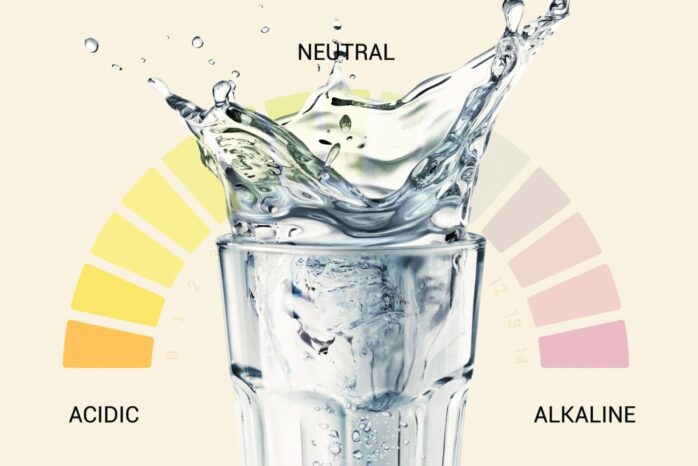
Water is not just a basic necessity for life; it’s a canvas for a vast array of health trends and discussions. Among these, alkaline water has emerged as a subject of significant interest and debate. It’s more than just the latest health fad; it’s a topic rich with complexities, myths, and potential benefits that warrant a closer look.
The Essence of Alkaline Water
At its core, alkaline water differs from regular drinking water primarily in its pH level. While standard water typically holds a neutral pH of 7, alkaline water boasts a higher pH, usually around 8 or 9, making it less acidic. But it’s not just about the pH; alkaline water also brings to the table a unique blend of minerals and a negative oxidation-reduction potential (ORP), which measures its ability to act as an antioxidant. The more negative the ORP, the stronger its antioxidizing properties.

Health Claims: Fact or Fiction?
The conversation around alkaline water is often peppered with a range of health claims. From anti-aging and weight loss to boosting the immune system and even preventing serious diseases like cancer and heart disease, the purported benefits are extensive. But what does science say? The truth is, the evidence is a mixed bag. Some studies back up certain benefits, while others show little to no difference compared to regular water. It’s a landscape of intriguing possibilities but also one that requires a critical and informed eye.
Hydration and Beyond
Among its claimed benefits, enhanced hydration, especially post-exercise, is a standout. Athletes have reported quicker recovery times and better hydration when they swap regular water for its alkaline counterpart, likely thanks to its mineral content.
Then there’s acid reflux – a condition that plagues many. A study in the Annals of Otology, Rhinology & Laryngology found that water with a pH of 8.8 might be effective in deactivating pepsin, a key enzyme involved in reflux conditions. This is a promising area, though it’s clear that more research is needed to fully understand the potential benefits.
Bone health is another interesting facet of the alkaline water conversation. Some research suggests that alkaline water might be beneficial for bones, helping to reduce the process of bone resorption where bones break down and release minerals into the blood. It’s a tantalizing prospect, but again, it’s a topic under ongoing research.
Taste, Cooking, and Everyday Use
Moving beyond health, alkaline water also wins points in the taste department. Many describe it as smoother and silkier than regular water, which not only makes for a more pleasant drinking experience but can also enhance the flavor of food and beverages prepared with it. Coffee lovers, for example, might find their brew less acidic and bitter, while veggies cooked in alkaline water may taste more natural and flavorful.

Potential Downsides: A Word of Caution
However, it’s crucial to approach alkaline water with a balanced perspective. Consuming it in excess can lead to an alkaline imbalance in the body, potentially causing symptoms like nausea, vomiting, and confusion. Moderation is key.
Alkaline Water’s Economic and Cultural Footprint
Economically, alkaline water is not just a health trend; it’s a booming industry. The rising demand has led to significant growth in the market, with companies investing in technologies to create alkaline water through filtration systems and additives. It’s a sector where consumers are willing to pay a premium, perceiving alkaline water as a healthier alternative.
Culturally, the appreciation of alkaline water spans the globe. In Japan, for instance, it’s known as “Kangen Water” and has been part of health practices for decades. The concept fits well with Eastern medicine’s emphasis on body pH balance. Western cultures have more recently caught on, thanks in part to the globalization of health trends.
The Role of Marketing and Sustainability
Marketing has played a pivotal role in alkaline water’s popularity, with celebrity endorsements and lofty health claims drawing consumers. However, this has sometimes led to misinformation, underlining the importance of research and informed decision-making.
From an environmental standpoint, the production and distribution of alkaline water, often packaged in plastic bottles, raise concerns. Some companies are countering this by adopting eco-friendly packaging or encouraging the use of reusable bottles with alkaline filters, aiming to reduce the environmental impact.

Home Filtration Systems
On the home front, alkaline water filtration systems are becoming increasingly popular. These systems range from simple jug filters to more complex under-sink installations, allowing consumers to enjoy alkaline water straight from the tap. It’s a trend that’s not only cost-effective but also environmentally conscious, reducing the reliance on bottled water.
Educating the Consumer
In this evolving market, education remains key. Consumers need accurate, evidence-based information to navigate the myriad claims and choices surrounding alkaline water. Companies and health professionals have a role to play in providing clear, reliable information.
Regulatory Landscape
The regulation of alkaline water varies worldwide, categorized either as a health product or a food product, depending on the region. Such regulation is vital for ensuring the safety and quality of alkaline water and protecting consumers from misleading claims.

Integrating Alkaline Water into a Healthy Lifestyle
Incorporating alkaline water into daily life can be a positive step, but it should be part of a broader, balanced lifestyle that includes a healthy diet and regular exercise. It’s a complementary element, not a panacea for health and wellness.
Conclusion
Alkaline water is a complex and intriguing subject. It offers potential health benefits. But it requires a balanced and informed approach. Environmental sustainability, consumer education, and regulation are important factors. As research continues, our understanding of alkaline water will evolve.
Integrating alkaline water into daily life can contribute to overall wellness.
For those seeking to learn more about this fascinating topic, a wealth of information is available at all about alkaline water.











